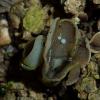
11-02-2026 22:15
 William Slosse
William Slosse
Today, February 11, 2026, we found the following R

11-02-2026 19:28
 Lothar Krieglsteiner
Lothar Krieglsteiner
on small deciduous twig on the ground in forest wi

25-04-2025 17:24
Stefan BlaserHi everybody, This collection was collected by J�

10-02-2026 17:42
 Bernard CLESSE
Bernard CLESSE
Bonjour à toutes et tous,Pourriez-vous me donner

10-02-2026 18:54
Erik Van DijkDoes anyone has an idea what fungus species this m

09-02-2026 20:10
 Lothar Krieglsteiner
Lothar Krieglsteiner
The first 6 tables show surely one species with 2

09-02-2026 14:46
Anna KlosGoedemiddag, Op donderdag 5 februari vonden we ti

02-02-2026 21:46
Margot en Geert VullingsOn a barkless poplar branch, we found hairy discs
Peziza spec.
Björn Wergen,
13-10-2010 12:38
 Salut,
Salut,during on one of my last expeditions I have found some Pezizas, Peziza succosa and another one, still undetermined. Microscopical data let me decide to call it Peziza succosella, but the form of the spores are not that ellipsoid like P. succosella has it...well let me give you a description of it:
Fruitbody 20-30 mm, cup-like, with violaceous to brown-violaceous hymenium and a pale violett to greyviolett, rough outside, gives a opalescent "latex" after breaking it.
Spores ellipsoid to distinct fusiform, with distinct warts 1-1,5 µm high, even more conspicuously (broader, not higher) at the poles (see photos), with only one vakuole, sometimes with one big and some smaller ones, 17-19 x 9,5 -11 µm.
Paraphyses cylindrical, with swollen apex, septate, in the apex filled with brown-orange material, 3,6 µm, apex up to 5 µm broad.
Found on soil, between moss in a Fagus-forest.
Nicolas VAN VOOREN,
13-10-2010 21:13

Re:Peziza spec.
This is Peziza succosa.
Björn Wergen,
13-10-2010 23:03

Re:Peziza spec.
sure? The "two" species grew together and were definitely distinguishable from each other by different colous and fruitbody-size...I had lots of succosa collections this year to see the difference to this species here, especially the exceptional formed spores (nearly fusiform) and the broader warts at the poles...
cheers, kazuya
cheers, kazuya
Nicolas VAN VOOREN,
15-10-2010 07:57

Re:Peziza spec.
P. succosa offers a great variabilty in its macrsocopic aspects. Your first photograph is typical: white latex, becoming yellowish when drying, colour of hymenium, colour of the external surface. The microscopic features are also in accordande with this species.
Is it possible to see the spores in CRB?
Is it possible to see the spores in CRB?
Björn Wergen,
18-10-2010 14:02

Re:Peziza spec.
Hi Nicolas,
its not possible for me to see spores in CRB, I do not have any chemicals to proof it...
cheers,
Kazuya
its not possible for me to see spores in CRB, I do not have any chemicals to proof it...
cheers,
Kazuya



